Growing up in the Pacific Northwest I fell in love with the mountains: backpacking with friends and children. Nothing, I thought, could be as beautiful as a sweep of alpine meadow leading to a snow-capped peak.
Then, 15 years ago, friends took me into the Boundary Waters and I fell in love again. Since then I’ve spent as much time as I can there, leading groups, many of whom have never been into the BWCAW before.
How can our northern lakes possibly be as beautiful as the Cascade Mountains? If I produced a slide show of Skyline Divide, meadows leading up to Mount Baker and then pictures of Tuscarora Lake, and asked you—okay, which is most breathtaking?—I know what you’d say.
A couple years ago, within a few weeks, I backpacked in the North Cascades Wilderness and paddled to a favorite Minnesota lake. And it hit me: it’s the light.
I pull my canoe up to a rock on Cross Bay Lake: the sun pours down, hitting the water and sparkling. Rippled reflections dance on every surface— stones, trees, waterside plants—soaking the scene with light. Light shimmers on every thing—animal, vegetable and mineral. The Boundary Waters stirs my soul because it gives me a powerful God metaphor: God as light source, light shimmering, light reflecting—till the world dances with light and I’m floating on it, dazzled by it.
Theologians suggest that perhaps the best way to understand the Christian idea of Trinity is dance. God expresses self in a constant dance of creation, reaching out to pull others into the dance. Not hierarchical— like old paintings of a bearded old man, a young man and a bird. Instead—God personal, God moving, God relational, God overflowing.
God as dance, God as light on lakes.
New metaphors for God? Dangerous? No, necessary.
All religious thinking/ expressing is inherently metaphorical. We must express the intangible with the tangible. In other words we can only express that which is beyond us in words and symbols that we have at our disposal. (See theologians like Aquinas and Anselm, for example.) Just as Jesus used metaphors like sowing seeds, protective shepherds, and Paul used the armor on a nearby Roman guard to discuss Christian experience, so we must find metaphors that help express something of our experience of the divine. In a religious world desperately clinging to the propositional truth of modernism, people can dispute until they’re blue in the face, and it takes us nowhere; what we need is open eyes, ears and hearts.
The only real danger is when we think we’ve got it all figured out. St. Augustine put it this way: “When I think I have understood God, then what I’ve understood is certainly not God.”
Or C. S. Lewis wrote this:
My idea of God is not a divine idea. It has to be shattered time after time. God shatters it himself. He is the great iconoclast. Could we not almost say that this shattering is one of the marks of his presence? The Incarnation is the supreme example; it leaves all previous ideas of Messiah in ruins. And most are offended by the iconoclasm and blessed are those who are not.
So, the question: In our lives, what speaks to us of God? How can we open our eyes to see, our ears to hear?
We in the Anglican Communion (the worldwide body of which the Episcopal Church is part) like to say that authority (how we know what to believe) is like a three-legged stool: scripture is pre-eminent, but tradition and reason also count. I’m jealous of the Methodists who add a fourth leg—experience. So I’m adding it anyway…please don’t tell The Archbishop of Canterbury on m.
When I’m on on of our northern lakes, I am given a great gift—an experience of what God the Trinity must be like—pouring out, shimmering (not and dancing—light overflowing, reflecting, pulling me into a great dance). At northland do you see God?
Each month a member of the Cook County Ministerium will offer Spiritual Reflections.
For August, our contributor is Mary Ell n Ashcroft the priest in charge of Spirit of the Wilderness Episcopal Church.



Loading Comments